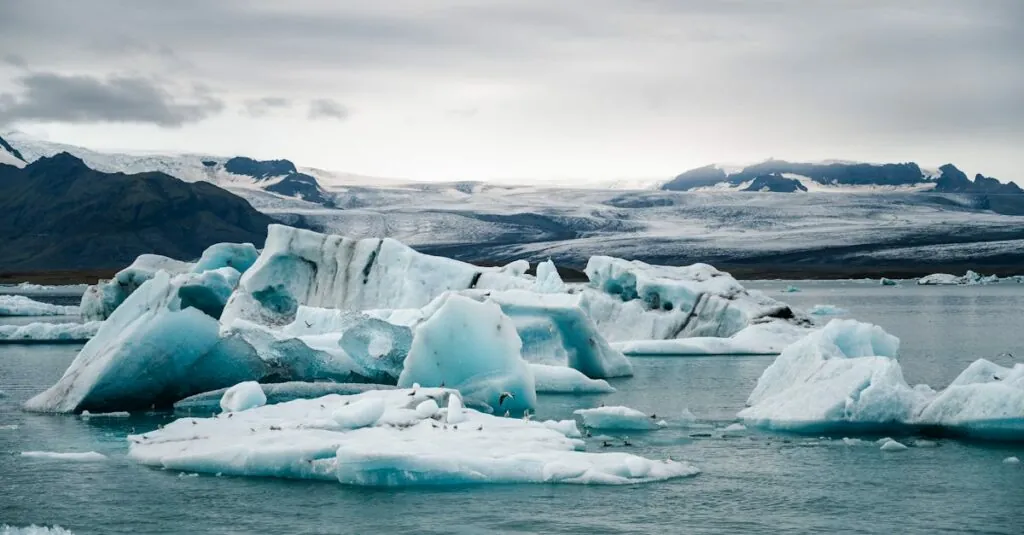Table of Contents
ToggleAs I dive into the topic of climate change, I can’t help but wonder how ancient texts like the Bible speak to our modern environmental challenges. It’s fascinating to explore the intersection of faith and stewardship, especially when considering how biblical teachings can guide our actions toward the planet.
Many people might not realize that the Bible offers insights into caring for creation. From Genesis to Revelation, themes of stewardship and responsibility resonate throughout its pages. In this article, I’ll unpack what scripture says about our role in protecting the environment and how these teachings can inspire us to take meaningful action against climate change.
Key Takeaways
- The Bible emphasizes stewardship and responsibility for the environment, urging individuals to care for creation as an act of faith.
- Key scriptures, such as Genesis 1:26-28 and Micah 6:8, highlight humanity’s duty to manage, protect, and act justly towards the Earth and its resources.
- Climate change is primarily driven by human activities, including greenhouse gas emissions and deforestation, which can be mitigated through sustainable practices.
- Modern applications of biblical teachings encourage advocacy for climate justice and ethical treatment of all living beings as part of faith-based environmental stewardship.
- The connection between God’s sovereignty and creation care affirms that responsible environmental actions reflect reverence for the Creator’s design and purpose.
- Engaging in conservation and promoting renewable energy sources aligns individual actions with spiritual commitments and contributes to a sustainable future for the planet.
Overview of Climate Change
Climate change refers to significant alterations in global temperatures and weather patterns over time. It’s primarily driven by human activities that increase greenhouse gas emissions. Notable contributors include the burning of fossil fuels, deforestation, and industrial processes.
Key Factors of Climate Change
- Greenhouse Gas Emissions: Carbon dioxide and methane are main contributors, trapping heat in the atmosphere.
- Deforestation: The removal of trees reduces carbon storage, exacerbating the greenhouse effect.
- Industrial Processes: Activities such as manufacturing and agriculture release significant amounts of greenhouse gases.
Effects of Climate Change
- Rising Temperatures: Global average temperatures rose by about 1.2 degrees Celsius since the pre-industrial era.
- Extreme Weather Events: Increased frequency of hurricanes, droughts, and heatwaves disrupt ecosystems and human communities.
- Melting Ice: The Arctic ice is diminishing, leading to rising sea levels and threatening coastal areas.
- Paris Agreement: An international treaty aimed at limiting global warming to below 2 degrees Celsius.
- Renewable Energy Initiatives: Countries are investing in solar, wind, and other renewable energy sources to reduce dependence on fossil fuels.
- Conservation Efforts: Ecosystem restoration and sustainable resource management practices are gaining attention to mitigate climate impacts.
Biblical Teachings on Nature
Biblical teachings emphasize the importance of caring for nature and highlight the connection between faith and environmental stewardship. These scriptures inspire individual and collective responsibility for the planet.
Stewardship of the Earth
Genesis 1:28 commands humanity to “fill the earth and subdue it” and “have dominion” over all living things. This includes responsible management of resources, ensuring ecological balance, and promoting biodiversity. Biblical stewardship calls for active nurturing of the environment, reflecting God’s creation. Psalms 24:1 reminds us that “The earth is the Lord’s, and everything in it,” emphasizing that all creation ultimately belongs to God, encouraging a mindset of caretaking rather than exploitation.
The Role of Humanity
The Bible presents humanity as stewards, tasked with safeguarding creation. Micah 6:8 encapsulates this responsibility, urging individuals to “act justly, love mercy, and walk humbly.” This call to justice extends to environmental actions, advocating for equitable use of resources. Additionally, Romans 8:19-21 speaks of creation awaiting liberation from decay, suggesting that humanity’s actions affect the natural world profoundly. Through stewardship, I engage actively in protecting and healing the environment, aligning my efforts with biblical principles that prioritize sustainability and compassion for all living things.
Key Scriptures Related to Climate Change
The Bible contains numerous passages that touch on environmental stewardship and humanity’s relationship with creation. These scriptures provide insights into how I can responsibly care for the Earth.
Genesis and Creation
Genesis lays the foundation for understanding humanity’s role in creation. Genesis 1:26-28 states that God created humanity in His image and commanded us to “be fruitful and multiply, and fill the earth and subdue it.” This directive emphasizes my responsibility to manage and protect the resources of the planet. In Genesis 2:15, it specifically mentions that God placed Adam in the Garden of Eden “to work it and keep it,” illustrating the importance of stewardship. These verses highlight that my actions should prioritize sustainability and respect for the natural world.
Prophetic Writings
The prophetic books convey a powerful message about justice and caring for creation. In Isaiah 24:4-5, the earth mourns due to the actions of its inhabitants: “The earth dries up and withers; the world languishes and withers.” This serves as a warning that my neglect of environmental issues leads to harm. Jeremiah 12:4 also addresses the consequences of wickedness, stating that “the land mourns.” These verses encourage me to pursue justice and equity, aligning my actions with the well-being of both people and the planet, ultimately creating a more sustainable future.
Theological Perspectives on Climate Change
The Bible provides significant insights into our responsibility toward the environment, connecting God’s sovereignty with our role in creation care. These insights inform a theological understanding of climate change.
God’s Sovereignty and Creation Care
God’s sovereignty over creation underscores our duty to care for the Earth. Colossians 1:16-17 states that all things were created by God and for God, affirming His authority over nature. This passage indicates that human actions must reflect reverence for the Creator’s design.
Psalm 104 highlights God’s provision for all creatures, showcasing the intricate balance within ecosystems. Our role as stewards involves maintaining this balance, ensuring sustainability for future generations. Genesis 1:28 commissions humanity to subdue the Earth, which implies responsible management rather than exploitation.
Moral Implications for Believers
Believers face moral imperatives derived from Scripture regarding climate change. Micah 6:8 calls for justice, mercy, and humility, principles directly applicable to environmental stewardship. Actions affecting climate could be viewed as reflections of a believer’s commitment to these values.
Proverbs 12:10 further emphasizes care for animals, reinforcing the idea that ethical treatment of all creation matters. Romans 12:1 encourages believers to present their bodies as living sacrifices, a concept that can extend to how we treat the planet. Ethical living involves recognizing our interconnectedness with all living beings and acting responsibly to mitigate climate change’s impacts.
Modern Relevance and Application
Biblical teachings on creation and stewardship hold significant modern relevance in the context of climate change. The call to responsible resource management resonates strongly with today’s environmental challenges. Genesis 1:28 highlights this imperative, emphasizing humanity’s role in managing and protecting the Earth. It invites me to engage actively in ecological practices that promote sustainability and balance within our ecosystems.
The moral implications of these scriptures extend into my daily life. Micah 6:8 reminds me to act justly and love mercy, which includes advocating for climate justice. This means supporting policies that address environmental degradation and vulnerable communities disproportionately affected by climate change. Proverbs 12:10 underscores the ethical treatment of animals, reinforcing my responsibility to consider all living beings in my choices, whether that’s in consumption habits or lifestyle changes.
The sovereignty of God over creation, as reflected in Colossians 1:16-17, frames my perspective on environmental issues. It cultivates a sense of awe and responsibility, prompting active participation in conservation efforts. Romans 12:1 encourages me to live sacrificially, which can translate into reducing waste, recycling, and promoting renewable energy sources within my community.
Isaiah 24:4-5 conveys urgent warnings about neglecting the Earth’s well-being. It challenges me to reflect on the long-term consequences of inaction. The prophetic messages contained in the Bible drive home the point that my choices today shape the future of the planet.
Participating in climate action, aligned with scriptural values, transforms not only environmental practices but also spiritual commitments. It becomes clear that integrating faith-based perspectives enriches the dialogue around climate change. I find encouragement in knowing that my efforts contribute to a larger narrative about care for creation, echoing ancient wisdom in a modern context.
The Bible offers profound insights into our role as caretakers of the Earth. It challenges me to reflect on my actions and the impact they have on creation. By embracing stewardship and responsibility as outlined in scripture, I can contribute to the fight against climate change.
It’s clear that integrating these biblical principles into our daily lives can inspire meaningful change. Whether it’s advocating for justice or making sustainable choices, I’m reminded that every effort counts. As I engage with these teachings, I find renewed motivation to protect our planet and foster a healthier environment for future generations.







